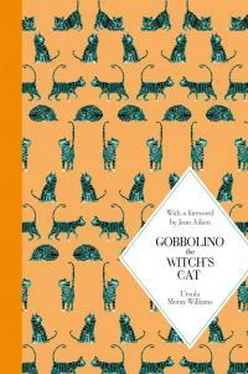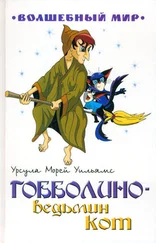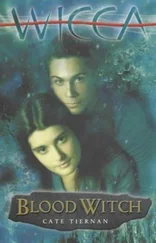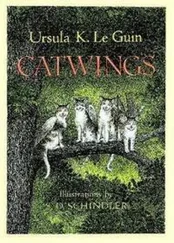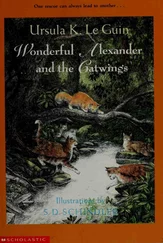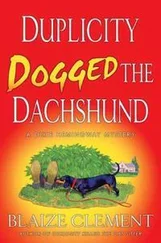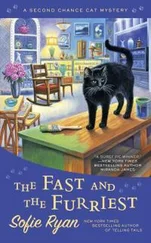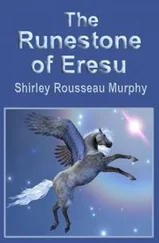Contents
Foreword
1 Gobbolino in Disgrace
2 Gobbolino is Left Alone
3 Gobbolino Finds a Home
4 Hobgoblin
5 The Orphanage
6 Gruel
7 The Lord Mayor’s Coach
8 The Lady Mayoress Doesn’t Like Cats
9 Gobbolino on Show
10 Gobbolino at Sea
11 The Little Princess
12 Punch and Judy
13 Gobbolino in the Tower
14 Gobbolino the Woodcutter
15 Gobbolino the Witch’s Cat
16 Gobbolino the Kitchen Cat
About the Author
Foreword
When I was young, I had a lot of books about cats. I didn’t see my father very often, as he and my mother were divorced, but every birthday he sent me a book, and at least six of them were cat stories – Millions of Cats , The True Philosopher and His Cat , The Cat, the Dog and the Dormouse , Tinkle the Cat , Puss in Books , The Cat of Bubastes . (I still have them all, which is lucky, as I’m afraid many of them are now out of print.) But one book I didn’t have was Gobbolino the Witch’s Cat , because it came out just after I had left school and was reading adult books. I had never read it until I was asked if I would like to write a foreword. Always happy to read a new cat story, I said I would love to, and read it in one joyful gulp.
Who could help loving Gobbolino? He is such an endearing character that it seems impossible that he should have so many misfortunes, that he should not be able to find a friendly home in the very first chapter of his story. And yet, time after time, something awful happens and he loses his opportunity.
When I was young, and in the middle of a gripping book, I used to creep out of bed and lie on the floor, reading by the ray of light that shone into my room from the oil lamp on the landing (there was no electricity in our village at that time). I read until some adult came upstairs and caught me at it and gave me a tremendous scolding. Gobbolino would certainly have been read in that way, for who could bear to stop reading when the poor little fellow is trudging along lonely roads or through wild forests? Some of his adventures are quite hair-raising, especially the last one, when it seems impossible that he can escape being thrown down the Hurricane Mountains by the evil witch.
I wonder why the witches in folk tales nearly always have cats, not dogs or pigs, as their companions? Is it because cats used to be worshipped in ancient Egypt and other long-ago civilizations? Or because cats are so cool and self-reliant, giving us the notion that they can get along quite nicely without us, thank you – apart from a bowlful of food when they want it, a warm bed to sleep in when required, and a bit of stroking five or six times a day.
Surprisingly, although cats so often figure as witches’ associates, there are not many folk tales in which cats are the heroes. There’s Puss in Boots, of course, but he is rather a bossy, uncat-like cat. There is Dick Whittington’s cat, another bossy character, persuading his master to turn back and become Lord Mayor of London. There’s the cat who rushed up the chimney squawking, “My stars! Old Peter’s dead and I’m the King of the Cats!” We don’t hear any more than that about him. And I remember, from Andrew Lang’s Pink Fairy Book , a touching story called “The Cat’s Elopement”. But apart from these I can think of few cats in folk tales – cats don’t choose to have their stories told.
Poetry seems to suit them better. There are plenty of cats in poems. There is “I love Little Pussy, His coat is so warm,” to which my father added the lines “And if I annoy him, He’ll chew off my arm.” There is a wonderful refrain in “Millions of Cats”: “Cats here, cats there, Cats and kittens everywhere, Hundreds of cats, Thousands of cats, Millions and billions and trillions of cats.” There is “Pussycat, pussycat, where have you been? I’ve been up to London to visit the Queen.” And then there is Thomas Gray’s cat who drowned in a tub of goldfishes. It must have been a very large bowl, or a very small and stupid cat!
Real cats, of course, vary in their natures just as much as humans do. I have met spiteful cats, loving cats, clever cats, stupid cats. A highly intelligent orange cat, January, who adopted my father one New Year’s Day, learned how to rattle the latch of the dining-room door, so that it would swing open and let him in. He also, all by himself, invented a charming trick: when you softly clapped your hands above his head, he would lift up his right front paw to be shaken. Then there was Gracchus, a tabby belonging to my sister, who used to come and stay at our house along with my two nieces for summer holidays. He was epileptic and had to be given a tiny pill every day. This aroused great feelings of jealousy in our cat Hamlet, who thought he was missing out on some treat – so terrific dexterity and diplomacy were needed to get the pill into the right cat. And then there was Darwin, dear Darwin, who always took a shortcut through the banisters, and liked to lie with his shaggy arms around one’s neck . . .
If, out of a lifetime’s acquaintance with cats, I were asked to pick one to take with me to a desert island, I would find it very, very hard to decide. But if I were asked to make a choice from all the cats in books that I have come across, the choice would be far easier. Not Puss in Boots – I want none of that phoney Marquis of Carabas routine on my island. Not Kipling’s Cat that Walked by Himself – he would always be walking off. Not Whittington’s cat, forever ordering me to turn back – because where would we turn back to? None of these would do. No – who but Gobbolino could be relied on to find a comfortable, snug home somewhere on that island, and lead me to it . . .
Sussex, 2001
1
Gobbolino in Disgrace
One fine moonlight night little Gobbolino, the witch’s kitten, and his sister Sootica tumbled out of the cavern where they had been born, to play at catch-a-mouse among the creeping shadows.
It was the first time they had left the cavern, and their round eyes were full of wonder and excitement at everything they saw.
Every leaf that blew, every dewdrop that glittered, every rustle in the forest around them set their furry black ears a-prick.
“Did you hear that, brother?”
“Did you see that, sister?”
“I saw it! And that! And that! And that! ”
When they were tired of playing they sat side by side in the moonlight talking and quarrelling a little, as a witch’s kittens will.
“What will you be when you grow up?” Gobbolino asked, as the moon began to sink behind the mountains and cocks crowed down the valley.
“Oh, I’ll be a witch’s cat like my ma,” said Sootica. “I’ll know all the Book of Magic off by heart and learn to ride a broomstick and turn mice into frogs and frogs into guinea pigs. I’ll fly down the clouds on the night-wind with the bats and the barn owls, saying ‘ Meee-ee-ee-oww! ’ so when people hear me coming they’ll say: ‘Hush! There goes Sootica, the witch’s cat!’ ”
Gobbolino was very silent when he heard his sister’s fiery words.
“And what will you be, brother?” asked Sootica agreeably.
“I’ll be a kitchen cat,” said Gobbolino. “I’ll sit by the fire with my paws tucked under my chest and sing like the kettle on the hob. When the children come in from school they’ll pull my ears and tickle me under the chin and coax me round the kitchen with a cotton reel. I’ll mind the house and keep down the mice and watch the baby, and when all the children are in bed I’ll creep on my missus’s lap while she darns the stockings and master nods in his chair. I’ll stay with them for ever and ever, and they’ll call me Gobbolino the kitchen cat.”
Читать дальше
